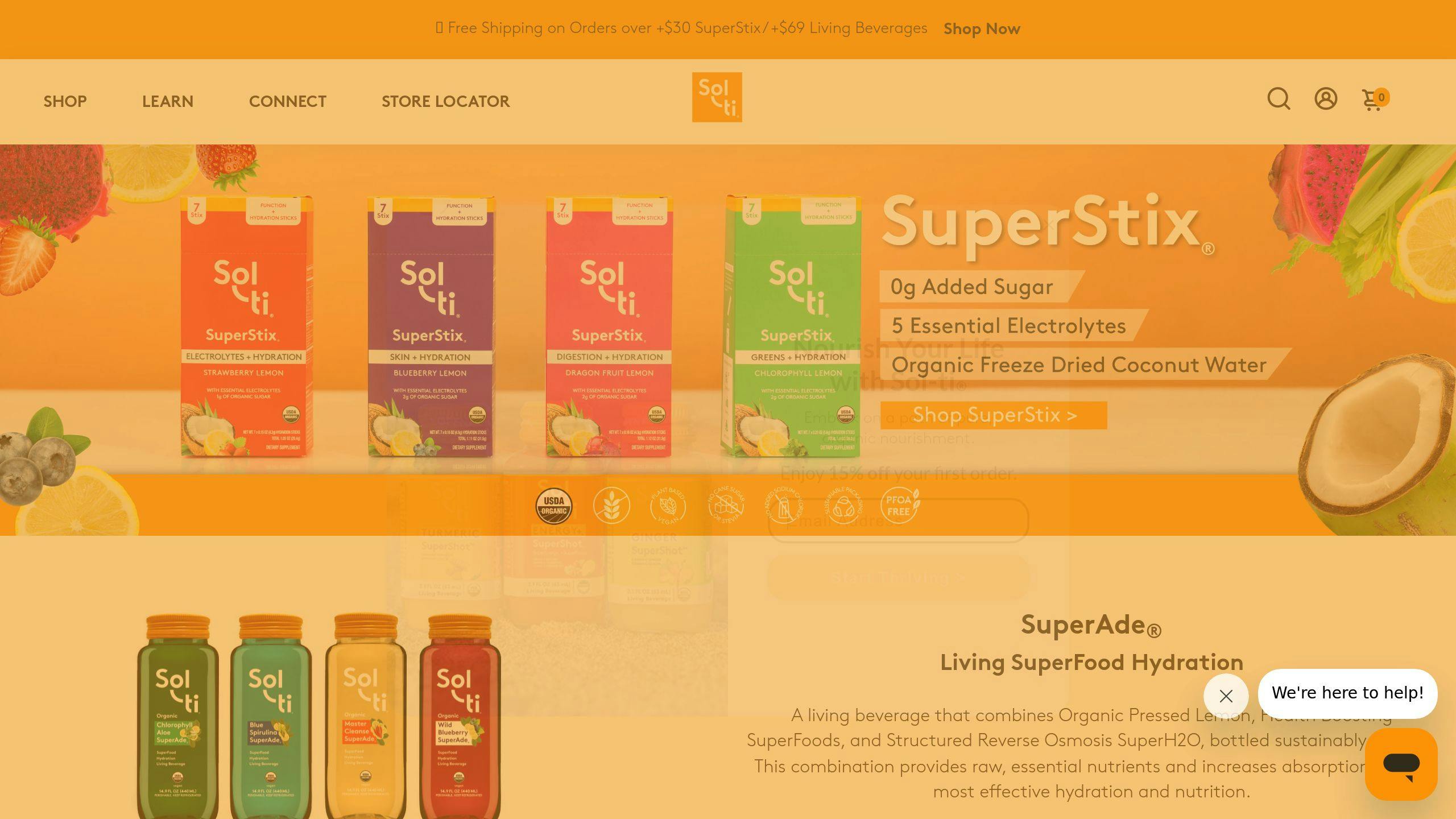Want to strengthen your immune system naturally? Focus on plant-based foods. They’re packed with nutrients like Vitamin C, Vitamin E, and antioxidants that help your body fight off infections and stay healthy. Here’s what you need to know:
- Top Foods: Citrus fruits, berries, leafy greens, garlic, ginger, and turmeric.
- Key Nutrients: Vitamin C (boosts white blood cells), beta-carotene (supports immunity), and fiber (promotes gut health).
- Hydration: Drink water consistently and try functional beverages like turmeric-infused drinks for added benefits.
- Lifestyle Tips: Manage stress, get enough sleep, and stay active to keep your immune system strong.
Ready to boost your immunity? Start by adding colorful fruits, vegetables, and herbs to your meals every day.
5 Foods to Build Your Immune System
Plant-Based Foods for Immune Support
Plant-based foods provide key nutrients and work together to help keep your immune system strong. Here’s a closer look at some of the top options nature provides.
Citrus Fruits and Berries
Citrus fruits like oranges and lemons are packed with vitamin C, which helps increase white blood cell production and reduce inflammation. Berries, such as blueberries and strawberries, are loaded with antioxidants and plant compounds that protect your cells from damage. For the best results, aim to include 1-2 servings of citrus and about 1 cup of berries in your daily meals.
Garlic, Ginger, and Turmeric
These herbs and spices bring unique immune-boosting benefits to the table. Garlic contains allicin, which has natural antibacterial and antiviral properties. Ginger helps with inflammation and digestion, while turmeric’s curcumin offers strong anti-inflammatory and antioxidant effects. Add them to your meals regularly to support your immune health.
Leafy Greens and Cruciferous Vegetables
Spinach, kale, broccoli, and Brussels sprouts are excellent sources of vitamins A, C, and E, along with antioxidants and fiber. These nutrients play a key role in maintaining immune defenses and overall health. Sweet potatoes also stand out for their beta-carotene, which helps your cells resist viral threats [2][3].
To get the most out of these foods, include a variety in your meals every day. Light steaming or eating them raw can help preserve their nutrients. While these foods form a solid base for immune health, staying hydrated and adding functional beverages to your routine can give your immune system an extra edge.
Hydration and Functional Beverages for Immunity
The Importance of Staying Hydrated for Your Immune System
Staying hydrated plays a key role in keeping your immune system working at its best. Dr. Christiane Meireles from UT Health San Antonio emphasizes:
"Proper hydration is essential for immune function, and even mild dehydration can impair immune function" [3].
When your body is well-hydrated, it can efficiently transport nutrients to cells and flush out toxins. Research highlights that even mild dehydration can lower antibody production, making it harder for your body to fight off infections [1]. To stay hydrated, drink water consistently throughout the day and check that your urine stays light in color.
Sol-ti's Functional Beverages

While water is essential, functional beverages can take hydration a step further by adding immune-supporting nutrients. Sol-ti's SuperAde® combines hydration with organic pressed lemon and nutrient-packed superfoods, while their SuperShot® delivers concentrated ingredients like turmeric and ginger, known for their anti-inflammatory properties.
Here’s a breakdown of key ingredients often found in these beverages and their benefits:
| Ingredient Type | Benefits | Examples |
|---|---|---|
| Antioxidants | Help combat free radicals and reduce inflammation | Turmeric, elderberry |
| Adaptogens | Support stress management | Ginger, medicinal mushrooms |
| Probiotics | Promote gut health and immune support | Fermented ingredients |
| Natural electrolytes | Improve hydration and mineral balance | Organic citrus |
To get the most out of functional beverages, try incorporating them into your morning routine or after workouts, when your body is more receptive to absorbing nutrients. However, these drinks should act as a complement to your daily water intake and a balanced diet, not a substitute.
While hydration and functional beverages are key for supporting immunity, don’t overlook other factors like quality sleep and managing stress, which are just as important for maintaining a strong immune system.
sbb-itb-74fe2fe
Lifestyle Practices for Better Immunity
Hydration is just the start when it comes to supporting your immune system. Key lifestyle habits like managing stress, getting enough sleep, and staying active play an equally important role.
Managing Stress and Sleep
Chronic stress can throw your immune system off balance, making you more prone to infections. Dr. Sheldon Cohen, a psychology professor at Carnegie Mellon University, highlights this:
"Chronic stress can suppress the immune system by altering the function of immune cells." [1]
Getting enough quality sleep is another cornerstone of immunity. Missing out on sleep can lower immune signaling proteins by as much as 30-40% [5]. To improve your sleep:
- Stick to a regular sleep schedule.
- Limit screen time before bed.
- Create a sleep-friendly environment that's cool, dark, and quiet.
You might also try a calming herbal tea, like chamomile or valerian root, as part of your nighttime routine.
Exercise and Outdoor Time
Regular exercise doesn’t just keep you fit - it can lower your risk of infections by up to 43% [2]. Aim for 150 minutes of moderate activity each week, such as walking, cycling, or yoga. Spending time outdoors adds even more benefits by boosting vitamin D levels and easing stress. Research even shows that outdoor activities improve immune function, especially in children [4].
Beyond physical activity, your diet also plays a vital role in keeping your immune system strong.
Gut Health and Probiotics
Did you know your gut microbiome has a major impact on your immune health? Including fermented foods in your diet can help support it [3]. Here are some options:
| Food Type | Benefits |
|---|---|
| Kimchi | Packed with diverse probiotics |
| Sauerkraut | Full of beneficial bacteria |
| Plant-based yogurt | Aids gut barrier function |
| Miso | Contains helpful enzymes |
Dr. Emeran Mayer suggests focusing on fiber-rich foods and polyphenols to maintain a balanced gut microbiome. Incorporate a variety of plant-based foods and probiotic-rich options to keep your gut - and your immune system - functioning at its best.
Creating a Plant-Based Meal Plan
Focusing on plant-based foods packed with nutrients is a great way to support your immune system. Let’s dive into practical tips for building meals that help keep your immune defenses strong.
Basics of Meal Planning for Immune Support
To start, aim for at least 2 servings of fruit and 8 servings of colorful vegetables each day [1]. Balance your meals by including these key components:
| Meal Component | Examples | How It Helps |
|---|---|---|
| Proteins | Lentils, chickpeas, tofu, tempeh | Helps maintain immune function |
| Complex Carbs | Quinoa, brown rice, sweet potatoes | Provides energy and essential nutrients |
| Healthy Fats | Avocados, nuts, seeds | Reduces inflammation |
| Leafy Greens | Kale, spinach, Swiss chard | Packed with vitamins and minerals |
WebMD highlights the importance of limiting sugar intake:
"Too much sugar curbs immune system cells that attack bacteria. Eat more fruits and vegetables, which are rich in nutrients." [1]
Once you’ve got the basics down, you can enhance your meals with foods and drinks that provide even more immune support.
Adding Functional Foods and Drinks
Functional foods and beverages can add an extra layer of immune-boosting power to your diet. For example, mushrooms are rich in unique phytochemicals and B vitamins that aid immune health [1][2].
Stay hydrated while supporting your immune system by sipping on drinks like Sol-ti's SuperAde® between meals. Start your day with a smoothie featuring turmeric and ginger, include fermented foods like kimchi or sauerkraut at lunch, and finish with a dinner bowl filled with plant-based proteins and vibrant vegetables. This approach ensures a variety of nutrients throughout the day.
Conclusion
Key Takeaways
A plant-based diet, when thoughtfully planned, plays a major role in keeping your immune system strong. Pairing plant-based foods with proper hydration and healthy habits helps build a resilient immune system. The secret lies in staying consistent and including a variety of nutrient-rich options.
Plant-based foods deliver nutrients like vitamins C and A, antioxidants, and fiber. These elements work together to support your immune system. Eating a wide range of plant foods ensures your body gets the diverse compounds it needs to stay healthy.
"Too much sugar curbs immune system cells that attack bacteria. Eat more fruits and vegetables, which are rich in nutrients" [1].
How to Get Started
Here’s how you can bring more immune-supporting foods into your daily life:
Add immune-boosting ingredients to every meal. For breakfast, go for citrus fruits or berries to get a vitamin C kick. At lunch, include leafy greens or cruciferous vegetables. For dinner, spice things up with garlic, ginger, or turmeric for their anti-inflammatory properties. Functional drinks like Sol-ti's SuperAde® or SuperShot® can also support your immune health by offering hydration and extra nutrients.
Take it slow and steady. Introduce one new immune-boosting food or habit at a time, giving yourself room to adjust naturally. By focusing on consistent nutrition, staying hydrated, and maintaining healthy practices, you’ll set yourself up for strong immune health all year long.
FAQs
What superfoods boost your immune system?
Certain plant-based foods are known to help strengthen immune function:
- Citrus Fruits and Elderberries: Packed with vitamin C, citrus fruits like oranges and lemons, along with elderberries, help improve immune cell activity and reduce inflammation [1].
- Roots with Benefits: Garlic contains allicin, which activates white blood cells. Ginger helps with inflammation and digestion, while turmeric's curcumin offers anti-inflammatory properties [1][6].
- Leafy Greens and Selenium Sources: Spinach and kale provide vitamin C and beta-carotene, both of which support the thymus gland in producing infection-fighting T-cells [2][3]. Brazil nuts are an excellent source of selenium, a mineral essential for a healthy immune response - just 1-2 nuts a day can meet your needs [2].
Staying hydrated is also crucial. Functional drinks like Sol-ti's SuperShot® can complement your diet with organic superfoods and structured water for added immune support.
To get the most out of these foods, include them regularly in your meals. Consistency is key - daily consumption is far more effective than occasional indulgence when it comes to supporting your immune system.


